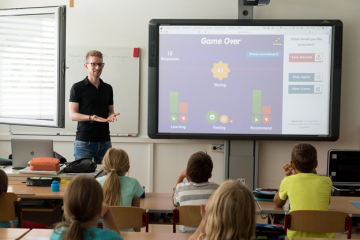 Does it really matter what your child chooses to read? In a device-driven culture, shouldn’t you just be happy he’s reading at all? While as parents we certainly don’t want to micro-manage our children’s reading habits, we think a good argument can be made for encouraging your kid to add a non-fiction title to his book selections. In fact, there are several compelling reasons why your child should include non-fiction texts in his reading repertoire.
Does it really matter what your child chooses to read? In a device-driven culture, shouldn’t you just be happy he’s reading at all? While as parents we certainly don’t want to micro-manage our children’s reading habits, we think a good argument can be made for encouraging your kid to add a non-fiction title to his book selections. In fact, there are several compelling reasons why your child should include non-fiction texts in his reading repertoire.
- Inspiring – Non-fiction books can be a good source of inspiration for children. A moving biography, for instance, can motivate kids to work hard to overcome obstacles; and a book about space may stir a life-long passion for astronomy.
- Educational – Works of non-fiction are chock-full of interesting facts with which your child may not otherwise become acquainted. Even if your kiddo is already familiar with the Civil War, a book about famous Civil War battles will provide interesting details that she may not already know.
- Challenging – Your kid may consider works of fiction easier to read than non-fiction. There’s certainly nothing wrong with having a reading preference, but an occasional nudge from a parent towards non-fiction titles can provide a much needed challenge.
- Different Text Features – When children read non-fiction they become acquainted with text features that do not normally appear in works of fiction. Indexes, time-lines, maps, headings, and subheadings are a few examples of features commonly found in non-fiction books.
- Expands Vocabulary – Reading of any kind serves to expand a child’s vocabulary, but exposure to non-fiction will introduce new words that might not normally be found in works of fiction.
- Prompts Questions – When children are exposed to new ideas or subjects, it often prompts further questions concerning the material. Non-fiction texts will whet your child’s appetite and inspire them to learn more about a topic.
- Raises Awareness – The reading of non-fiction can raise awareness about topics that were previously unfamiliar to your child. For example, books that deal with subjects such as world hunger, healthy eating habits, or recycling can impart life-changing knowledge.
You may have a kid who could happily read and reread the Harry Potter series of books for the remainder of her school career, and that’s fine – just encourage a foray into the non-fiction section next time you visit the library with her. Who knows? She may just discover that she enjoys a little deviation from the norm!


